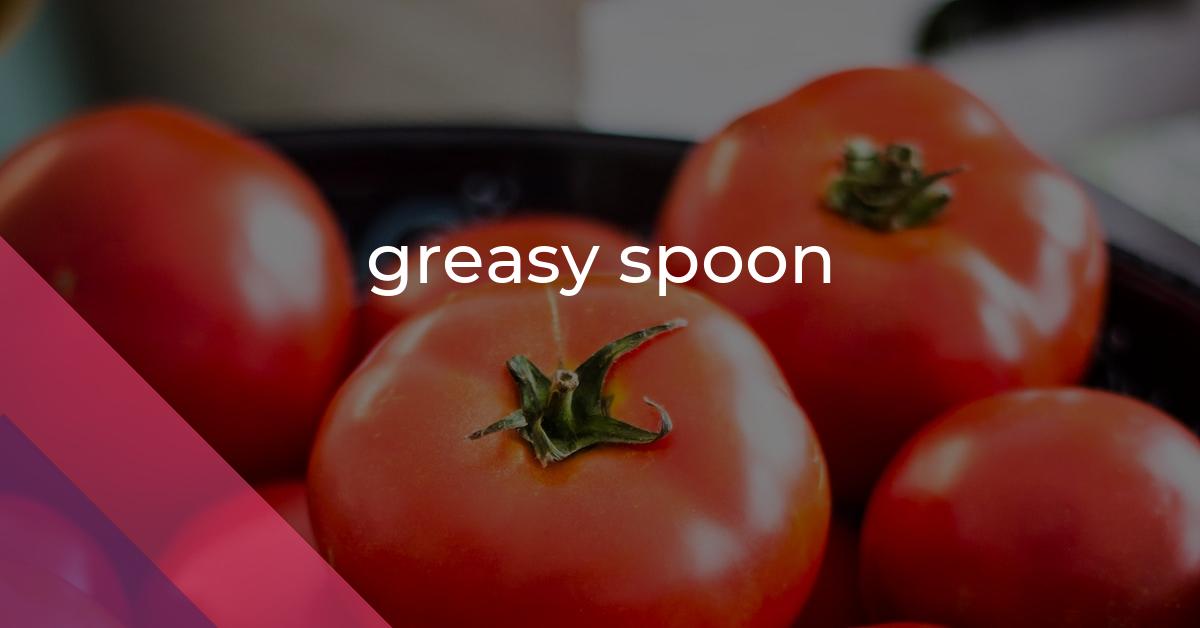greasy spoon: Idiom Meaning and Origin
What does ‘greasy spoon’ mean?
The idiom "greasy spoon" refers to a small, inexpensive, and often unsanitary restaurant or diner that serves simple, greasy food.

Idiom Explorer
The idiom "hunger sauce" refers to an imaginary or metaphorical sauce that intensifies one's desire or hunger for something. It emphasizes a strong craving or appetite for a particular thing or experience.
A "hash slinger" refers to a person who works as a cook or chef in a restaurant, especially one that serves quick and simple meals. The idiom is often used in a casual or derogatory manner.
The idiom "great unwashed" refers to the general public or the masses, particularly those considered to be uneducated or of lower social standing.
The idiom "grease the skids" means to make something easier or smoother, often by using influence or providing assistance.
The idiom "grease someone's palm" means to give or offer someone a bribe or money in order to gain favor, influence or illicitly expedite a desired outcome.
A "grease monkey" is a slang term for a mechanic, often used to refer to someone who works on cars or machinery. The term stems from the association of mechanics with getting dirty and using grease while working.
The idiom "gravy train" refers to an enjoyable situation where one can easily obtain money or success without much effort or work.
The idiom "grab and go" means to quickly take or pick up something and immediately leave. It implies a sense of efficiency and urgency, often used in the context of taking food or drinks from a place without sitting down to eat.
The idiom "good enough to eat" means something is extremely delicious or attractive, to the point where one might want to consume or devour it.
The idiom "free lunch" refers to something that appears to be given at no cost, but actually comes with hidden or future expenses. It highlights the concept that nothing is truly free and often implies that there is a catch or a trade-off involved.
Hidden Tales
The idiom "greasy spoon" originated in the early 20th century and is primarily used in the United States. It refers to a small, cheap, and often unclean restaurant or diner. The term "greasy" emphasizes the abundance of greasy or fried food typically served in such places. "Spoon" is a metaphorical reference to utensils used for eating, suggesting that the food served in these establishments is best eaten with a spoon due to its consistency or quality.
The idiom is believed to have its roots in working-class and urban communities, where these types of restaurants were prevalent. The phrase gained popularity in the mid-1900s, during a time when many American cities experienced significant industrialization. It is often associated with urban areas and is particularly used to describe establishments frequented by blue-collar workers or late-night diners looking for a quick and inexpensive meal.
The negative connotation of the term "greasy spoon" arises from several factors. Firstly, the use of the word "greasy" implies that the food served in these places is of low quality and high in fat content. Secondly, the term suggests that the restaurants may have poor hygiene standards, leading to a perception of uncleanliness. Lastly, the association of the idiom with working-class neighborhoods and industries contributes to its reputation as a less desirable dining option.
In popular culture, the idiom "greasy spoon" has been depicted in various forms of media. It is often used to create an atmosphere or highlight specific character traits. For example, in the film "Pulp Fiction," one of the characters frequents a greasy spoon diner where he orders a "Royale with Cheese." This use of the idiom helps establish the character's nonchalant attitude and his preference for inexpensive, low-quality food. Similarly, in the television show "Breaking Bad," the main character, Walter White, and his partner, Jesse Pinkman, often meet at a greasy spoon diner to discuss their illicit activities. This choice of setting reflects their working-class backgrounds and the secretive nature of their business.
While the idiom primarily refers to a type of restaurant, it can also be metaphorically extended to describe other things or situations. People may use the phrase to describe a place or establishment that is shabby, run-down, or lacking in sophistication. For example, you may hear someone say, "That hotel we stayed at last night was a real greasy spoon." Here, they are using the idiom to convey that the hotel was not up to their standards and had a less than desirable atmosphere.
Another related idiom is "duck soup," which is used to describe something that is very easy or effortless. It originated in the early 20th century and its exact origin is uncertain. The idiom is thought to have derived from the idea that ducks easily consume soup-like water by dipping their bills into it. In this context, the idiom suggests that a task or situation is as easy as eating soup for a duck. So, if someone says, "Fixing that broken chair is duck soup," they are implying that the task is extremely easy and requires minimal effort.
A third related idiom is "grease monkey," which refers to a person who works on automobiles, especially as a mechanic. The idiom originated in the early 20th century and is believed to have originated from the idea that mechanics often have greasy hands and clothes due to the nature of their work. The term "monkey" is thought to be a colloquial reference to a person who is skilled or knowledgeable in a specific field. So, if someone says, "I need to take my car to the grease monkey to get it fixed," they are referring to a mechanic who can repair their vehicle.
The fourth related idiom is "grease the skids," which means to facilitate or make something happen more easily or smoothly. It originated in the early 20th century and is derived from the literal act of applying grease to the wooden skids or tracks used to move heavy objects. By greasing the skids, the movement of the objects becomes smoother and more efficient. In a figurative sense, "greasing the skids" refers to taking actions or providing assistance that makes a process or task easier to accomplish. For example, if someone says, "I'll talk to the manager and see if I can grease the skids to get you that promotion," they are offering to use their influence to make the promotion process smoother and increase the chances of success.
The idiom "greasy spoon" refers to a small, cheap, and often unclean restaurant or diner. It carries a negative connotation due to associations with low-quality food, poor hygiene standards, and working-class neighborhoods. The idiom has permeated popular culture and can be used metaphorically to describe other things or situations. It is often associated with blue-collar workers or late-night diners looking for a quick and inexpensive meal. Additionally, the related idioms "duck soup," "grease monkey," and "grease the skids" add further nuance to the topic of greasy spoons and extend its usage to describe easy tasks, automotive mechanics, and facilitating processes or tasks.
Example usage
Examples of how the idiom "greasy spoon" can be used in a sentence:
- The city is known for its charming greasy spoon diners, where you can get a delicious breakfast at an affordable price.
- After a night of partying, we stumbled into a greasy spoon for some late-night comfort food.
- She decided to try out the new restaurant in town, but was disappointed to find that it was just another greasy spoon with mediocre food.
The idiom "greasy spoon" refers to a small, inexpensive, and often unpretentious restaurant or diner that typically serves simple, hearty food. It is often associated with a casual and nostalgic atmosphere, with basic furnishings and a menu that includes classic comfort foods. The term "greasy spoon" may be used positively to express appreciation for the unpretentious nature and tasty food of such establishments, as seen in the first example. However, it can also be used negatively to convey disappointment or criticism of the quality or cleanliness of the food, as seen in the third example.
More "Restaurants" idioms
We missed the mark - nothing found.



